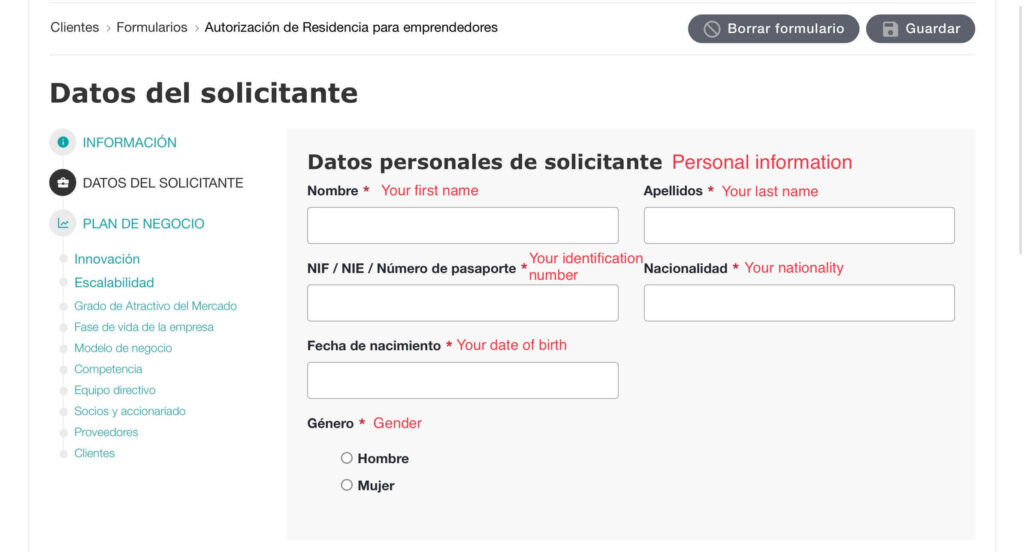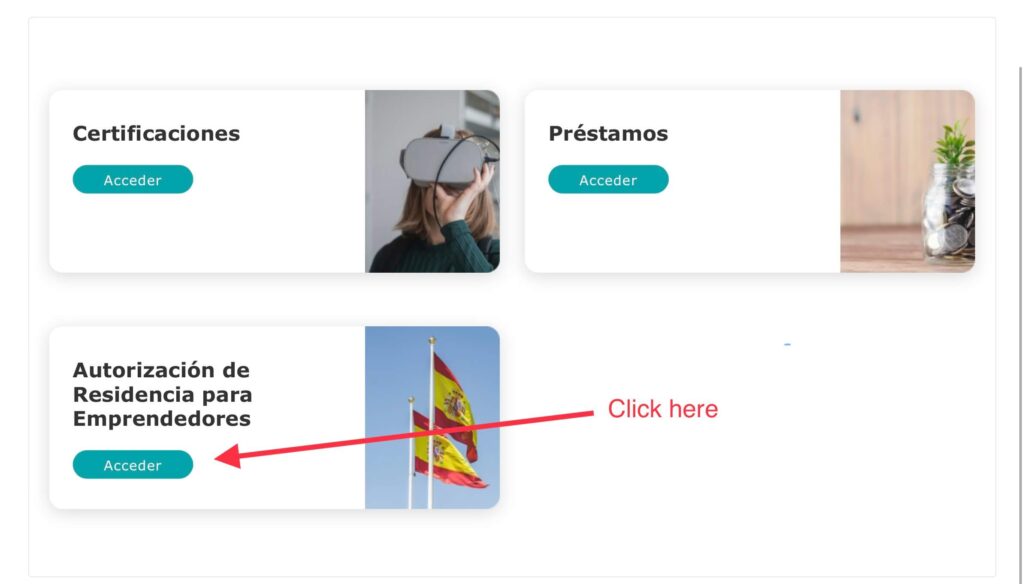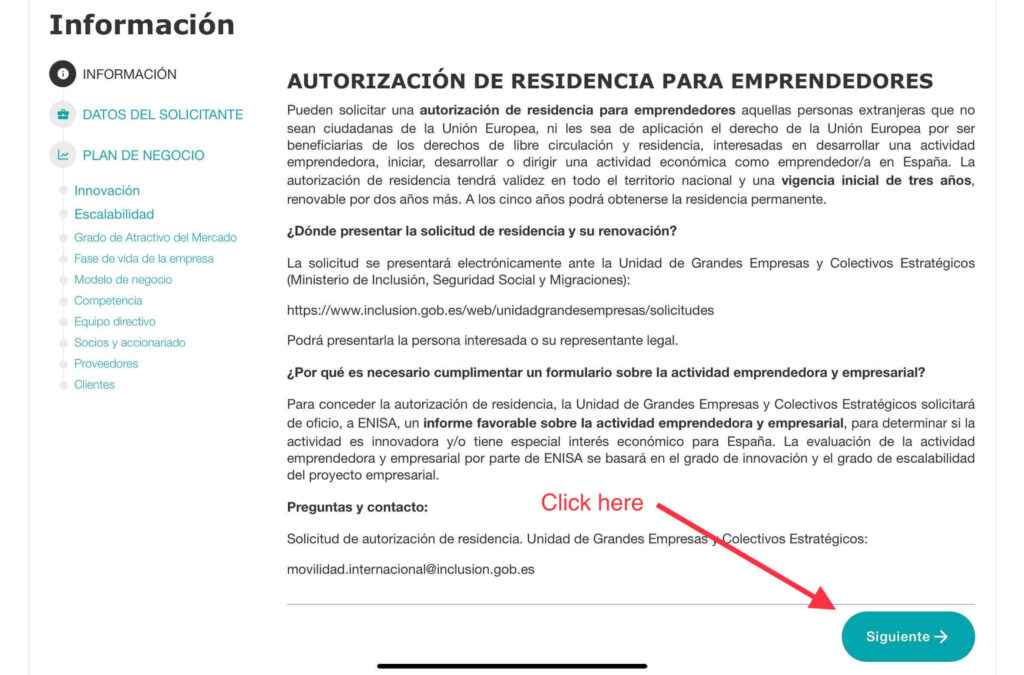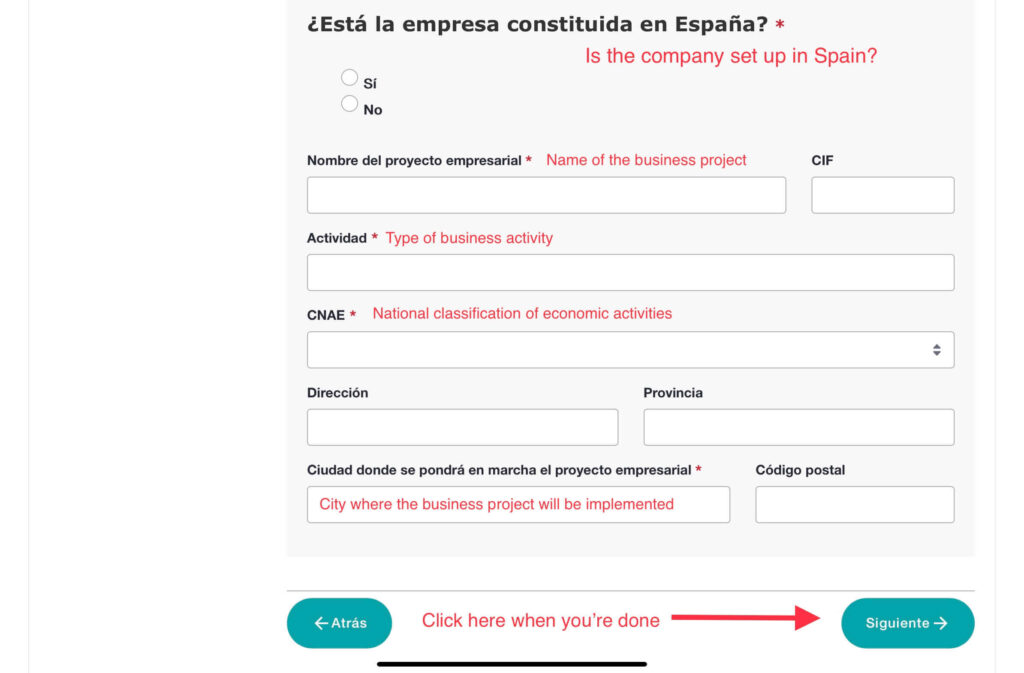With the implementation of the Entrepreneur’s Law, Spain has grown into one of the most thriving entrepreneur hubs in Europe. Foreigners from all over the world are applying for the Entrepreneur Visa to start a company in Spain and gain residency in the country, among all due to the great advantages this special type of residence permit grants to its holder.
But what exactly is this startup visa and how does it work? What are its benefits and how can you apply for it?
In this article, you will find all you need to know about setting up a business in Spain to get residency, including the exact requirements you need to meet and the steps you need to take to obtain the entrepreneur residency.
Let’s dive deep into it!
What is the entrepreneur visa in Spain?
The entrepreneur visa is a residence permit that allows you to live in Spain for three years provided that you start a project in the country that is in line with the general interest of Spain’s economy.
In that sense, we are talking about a residence permit created for non-EU citizens who want to open their startup in the Spanish territory.
By meeting certain requirements, the Spanish immigration law (through its 14/2013 Entrepreneur’s Act) will grant you residency thanks to your business idea.
So, as we have just mentioned, this path will allow you to get your visa as long as you open an innovative project that is aligned with the interests of Spain.
But what do we mean by general interest?
Starting any type of business idea won’t work. In order to be accepted, your project must fulfill the following conditions:
- It has to create employment for the country, at least in the long run. This means that your project must create new job positions and be a positive stimulus for the general Spanish economy
- It must create good investment opportunities
- Its operating process must involve a high level of technology (for example, the use of algorithms or machine learning) and enhance the socio-economic development of Spain
- It needs to be an original business and must not have other competitors in Spain, and if there are competitors, you must prove why your business project is better than the others
- Finally, having patents, recommendation letters or some clients will increase your chances of getting your application accepted
But how can you make sure that your project meets this requirement? How do you demonstrate it is innovative enough? Through your business plan. We will analyze that part in greater detail in the upcoming sections.
Related legislation: the 14/2013 Entrepreneur’s Law
Before moving forward it is worth talking about the legal framework within which this startup residency was created.
The Entrepreneur’s Law was born and published on the 27th of September 2013. Its main purpose was to assist entrepreneurs in their process of creating a new venture and with their internationalization.
Even though the most direct association we can make is with the entrepreneur visa (the permit we are talking about in this article), it also regulates other permits. Visas like the investor residence permit or the highly qualified visa are some of them.
One of the main advantages of any visa under this law is that it can be obtained while in Spain. Additionally, and unlike the rest of the residence permits that fall under the general immigration law, it grants the possibility to live in Spain for 3 years plus renewals (not just 1).
Furthermore, a fast resolution process is also a great advantage of this law.
Who is eligible for Spain’s startup visa?
To qualify for the Spain startup visa, your business idea must be truly innovative, something new to the market, often tech-driven or data-focused. This visa is ideal if your project stands out with a unique model and offers high growth potential.
If your business is more traditional or lacks a strong innovation component, the self-employed work permit is usually the better fit, though it must be applied for from outside Spain.
Other valid options to launch a business include:
- The golden visa (through investment)
- The family member of an EU citizen card (if your partner is an EU citizen)
In short, choose the startup visa for fast-track processing and if your project is cutting-edge. Otherwise, consider alternative permits that better match your business model.
Do you have any doubts so far? Then ask our immigration lawyers anything:
Entrepreneur visa in Spain: requirements
There are three main requirements you must meet in order to have your application accepted, and then the usual general ones that also exist with any type of visa.
Your professional profile
The first thing that the corresponding authority will check is your professional profile.
This is because the business idea is as important as your ability to execute and implement it in the real world. That is why you want to demonstrate, basically through your CV, who you are, where have you studied, what your profession is, and how your experience not only is related to your project but how it can help to implement it successfully.
The more experience, knowledge, and skills you can demonstrate you possess, the higher the likelihood of getting your approval. So having a degree or a master’s related to the core activities that will help your startup grow is crucial.
Entrepreneur visa business plan
This may be the most important document when it comes to your startup visa application.
The business plan is the document you will need to send to ENISA. It’s what they will use to evaluate and finally decide if you deserve the residency or not, based on how well you state the innovative component of your business idea.
What should you include in your business plan?
As a whole, your business plan must include a market, product/service, and financial analysis.
Thus, through it, you need to demonstrate that a real market opportunity exists for your project to succeed, that the product or service you plan to sell can be valuable enough for your target customers, and that you have found specific financing sources.
This last point is crucial. You must include a financial projection including specific funding you will receive to have your business operating effectively.
Overall, your project must be innovative and include a technological component.
Nevertheless, maybe you have no idea where to start and you would like to get some guidance regarding which company to start.
What would be of high demand in Spain? Which investment opportunities are worth it and which won’t succeed?
Just to help you out with that, we have created a list with some suggestions.
In the following article, we gathered the 25 best business ideas and companies to start in Spain. Low capital investment and a market with latent demand are what characterize all of them. Take a look!
Maximize your chances of success: Rely on specialists to craft your business plan
What do we recommend here? Relying on our specialized business lawyers to analyze and adapt it. At Balcells Group we make sure that your entrepreneur visa gets accepted by working hand in hand with you with the business plan.
We have dealt with thousands of clients so we know what to include and whatnot, and how to exactly present your project in order to increase your chances of success.
So if you need help here, do not hesitate to contact us at [email protected].
The company’s added value to the Spanish economy
Finally, and even though we are repeating ourselves, we need to stress this point again, as it is of great importance.
The company you set up to get the residency can’t be a restaurant or language school. It has to be something new, something that does not already exist in the country, and that it could certainly benefit Spain once created.
You need to demonstrate that your startup creates value for the Spanish economy, that it will be a great opportunity for both national and foreign investment, and that it is highly innovative.
Other general requirements
In order to successfully obtain an entrepreneur visa in Spain, focusing on the project is not enough. You will also need to meet the following general requirements:
- You must be from a non-European Union country
- You must be over 18 years old (legal age in Spain)
- You must have clear criminal records background in Spain and any other country you have resided in for the last 5 years
- At the moment of the application, you can’t be in an irregular situation in Spain
- You must have health insurance (public or private) with full coverage on the Spanish territory
- You must have sufficient economic means, which would be €30,250 in your bank account
Documents you need to submit to get your entrepreneur visa
If you are in a position in which all the prior conditions are met, you can start your application. Which are the specific documents you will need to submit?
- Corresponding application form
- Complete passport
- Proof of the payment of the corresponding fee
- A bank account balance certificate that demonstrates €30,250 in savings (for a second applicant it’s an additional €11,340, and for the rest an additional €3,780
- Business plan. You will need to submit your business plan, in which you carefully detail your activity and how it is going to benefit the Spanish economy. As we have already mentioned, emphasis on the creation of employment, innovation, and positive impact on the socio-economic growth of the country must be placed in this document
- Private health insurance, with full coverage in Spain
- University diploma or job experience of at least 3 years in the field
- Commitment of Social Security obligations once the permit is granted
Application process for the entrepreneur visa in Spain
So, how exactly do you get an entrepreneur visa in Spain?
Well, whether you are legally in Spain (because you CAN move from another type of permit into this one) or in your country of origin, the first step in applying for Spain’s entrepreneur visa is creating your business plan.
1. Draft and prepare your business plan
The heart of this visa is truly your business idea. Without it, there is no entrepreneur residence permit.
Once you have brainstormed and squeezed out the most innovative proposal in you, you’ll need to organize everything in a business plan. As you will see later in the article, the plan will need to include a market, product/service, and financial analysis.
This may sound intimidating, but don’t worry as our lawyers can, in fact, help you make sure your business plan is complete and adequate.
2. Submit it to ENISA
Once you have your business plan ready to go, it’s time to submit it to ENISA. ENISA is Spain’s national innovation company, and they are responsible for reviewing your plan and approving or rejecting it.
You will have to go to their webpage and register. Once you have verified your account and logged in, choose the section that says “Autorizacion de Residencia para Emprendedores” (Residence Authorization for Entrepreneur’s).
It will take you to an explanation of the residence authorization wherein you will just have to click on the “Next” button.
Then, you will have to provide information about yourself, your address, and information about your company.


Now, for the business plan sections. As you can see in the previous screenshots, you have two main criteria: Innovation and Scalability.
Innovation
Under the innovation section, your business will need to fall under one of the following criteria:
- Has received a grant and/or public subsidies for the development of R+D+I projects or innovative entrepreneurship, in the last 3 years. If a loan was given, a signed contract is also required
- Has an accredited request for Social Security bonuses for Research Personnel in the last year
- The Ministry of Science and Innovation has issued it a Binding Reasoned Report in the last 3 years
- Currently has an SME Innovative Seal or Young Innovative Company certification from the Spanish Association for Standardization and Certification (AENOR)
- Won or was a finalist in a Startup Award and/or Recognition at least at a regional level
If your company does not qualify for any of these, then you will have prove innovation by elaborating (in 3000 characters) one or more of the following:
- Development or use of patents
- Use of proprietary technology
- Differentiation in the company’s processes
- Differentiation of the product or service
- Differentiation in the business model
Scalability
The scalability section is where most of the analysis takes place. In this area, you will have to prove that your product or service is attractive to the Spanish market, and elaborate on how attractive it could be.
You’ll have to write about your business model including a product/service description, the company background, and investment projections. This includes fiscal projections that show how you will sustain and fund your business.
Furthermore, you will need to create job positions in Spain. Ideally, you must create 10 jobs within the first 3 years. If this is not possible, it’s better to be honest and try to create at least 5 job positions.
You will also need to prove how you are going to afford the job positions you are going to create and the expenses to start your business. You can demonstrate investors interested in your project or that you have enough savings to afford it.
You’ll also be asked about direct competitors, and the pros and cons of these companies in regard to yours. Then, you’ll have to expound on your supplier(s), as well.
Aside from the product/service you will also have to demonstrate the competence of your management team, and the experiences of your shareholders as partners in other companies.
3. Prepare your personal immigration documents + submit them at the UGE
After submitting your business plan to ENISA, the second step is sending your entrepreneur visa application to the Large Business and Strategic Groups Unit (UGE-CE).
As you will see later in this article in the requirements section, here is where your overall professional profile will also be checked, with the aim to validate that you possess sufficient experience and knowledge to run the company, and this is what the UGE-CE is responsible for.
This is done electronically, as well.
If ENISA approves your business plan, they will inform the UGE-CE, and then this institution will inform you about your favorable resolution.
However, as we mentioned, the entrepreneur visa has the advantage of offering positive administrative silence, so if you don’t hear from them after around 20 days, this also means you’ve received a favorable resolution.
Important Note
Although processing the residence authorization or immigration documents takes 20 days, ENISA has up to 3 months to review your business plan. Thus, the overall process, from submitting your business plan to ENISA and your documents to the UGE, to receiving your resolution, could take up to 4 months in total.
Additionally, especially if you submit the application from Spain, it is advisable to do both ENISA and UGE applications at the same time, as both administrations will communicate with each other and once the business plan is approved by ENISA, UGE will take care of your residency permit application automatically.
4. Process with the consulate / UGE + physical card
If you’ve received a favorable resolution, there are two different scenarios:
- If you are in your country of origin, you will have received a 1-year visa with which you can travel to Spain. Once in the country, you have that full year to apply for and exchange your visa for a 3-year residency card as an entrepreneur.
- If you are already in Spain (as a tourist or as the holder of another permit, like a student visa) and your application is approved, you can go ahead and start your business. Read more on how to do that here. You can also now schedule an appointment at a police office to begin the process for your physical residence card for 3 years.
5. What to do if your application is rejected
Let’s suppose that you have submitted your residency application, and you get a negative resolution.
Maybe Spanish authorities feel like your project does not go in hand with the socio-economic interest of the country, so you don’t get your entrepreneur visa. Maybe you directly do not meet the requirements.
What should you do?
In this case, you should apply for a temporary residence permit; and start working as a self-employed worker. For that, you will just need your NIE number. It is a similar permit, as it allows you to set up your own company also, but in this latter case, there is no need for the business to be innovative.
Another feasible option would be to invest in real estate in order to get your residency, under the Golden Visa scheme.
Main benefits of the Spanish startup visa
One of the main promises of this permit, after its creation in 2013, was to clear the path for entrepreneurs wishing to move to Spain.
Unlike in many countries, there is no upfront investment needed. So, this is just an example that demonstrates how good of an opportunity it is to get a startup visa in Spain is.
Just to give you some extra details, let’s review the main benefits of obtaining a residence permit for entrepreneurs:
- You will be getting a work permit without the need to go over the complex requirements a regular work visa demands
- With the entrepreneur visa, you will have free movement inside the countries that form the Schengen area
- There’s no need to come to Spain for the application. You can simply authorize a representative to apply for you, avoiding the need to travel to the country to get your business permit
- Joint application. Your family members can apply for their residence permit along with you. This makes the startup visa a good ticket for families who want to move to Spain together. You can bring both your parents (only if they are over 65 and economically dependent on you), your spouse, and your children under 18 years old
How to renew your entrepreneur visa in Spain
In order to renew your company set up visa, you will need to still meet all the requirements you met for the initial application. Basically, it means that your project still enhances the Spanish economy and promotes the creation of new employment. If your business has a good projection, your entrepreneur visa will be easily renewed.
You also should not have been outside Spain for more than 183 days while you were on your initial residence authorization permit.
This renewal will allow you to legally stay in the country for two additional years.
If you need help with the general application for the entrepreneur visa, renewal, or even with the creation of your business plan (so that it matches the interest of the Commercial Office), do not hesitate to ask our lawyers for help. We will be glad to answer any questions!
Setting up a company and living in Spain must be feasible. And that is what we want you to feel.
Book a consultation with one of our lawyers and solve all your doubts:

At Balcells Group we have been foreigners effortlessly moving to Spain for over 11 years. We help expats from all around the world with their immigration, business, tax and legal needs; ensuring a legally safe and enjoyable transition to the Spanish territory. Our multilingual team understands the importance of adapting to the cultural and legal specificities of our international clients. We offer a comprehensive service that combines the expertise of several generations of lawyers with the innovation needed to address today’s legal challenges, always striving to simplify processes and ensure reliable, effective results.







I want apply. And I want to know the proceeds
Hi Suraj!
If you would like to start now, we recommend you send us an email at [email protected] and the specialized lawyer will get in touch with you as soon as possible.
Thank you very much for reaching out to us, we will be glad to help you get your entrepreneur visa!
I want to start business in Spain. I have student Nie number. I have fund and business plan.
Hi Phuong!
In that case, just send us an email at [email protected] and our business lawyer will help you out with all the legal process.
Thank you very much for reaching out to us!
Hey i would like to support and join your company.
Hello. Thanks for this. Should all the documents be translated in Spanish?
Hi Maria!
Yes, when you submit your application all the documents must be legalized and translated into Spanish. In any case, we can help you with that so it does not become a problem.
Thank you very much for reaching out to us!
Good evening, I would like to complete an application for a residency authorization.I did download however not in English should I do this in Spanish?
I have a 2 year Shengen Visa, I like to incorporate a Limited Liability company as a sole shareholder. I do have the means to sustain my living in Spain and to invest in my business. It is not big however it will have huge potential to grow.
Like to grow my business to live full time in Spain,
currently I am in Europe.
Like to know the fee to put my business plans in a format to be totally accepted.
Hi Bibi,
First of all, yes, all the documents that you should submit for your application must be in Spanish and legalized properly.
We will contact you for further details regarding what you have asked.
Thank you very much for reaching out to us!
Hello.
I’m hoping to move my Australian based business to Spain. I have exisiting European clients, and I will employ staff in Spain.
Will this visa suit me and my partner? And does my partner need to work for me? Or is he able to look for work with this visa?
I will need help with setting up a business in terms of taxes, insurance etc.. can you please provide more information via email.
Thank you.
Hi Cathleen!
We are going to contact you as soon as possible in order to provide further details.
Thanks a lot for reaching out to us!
Hi
I want to establish a limited liability company in Spain
The subject of the trade plan: the purchase and sale of health care products and raw materials related to their production
Selling sports food products
And export them to Asian countries
my abilities :
Bachelor of Accounting
Has experience of doing accounting and auditing for 10 years
Has experience in doing business in the field of selling and selling cosmetics
Hi Hasan,
In order to start, we need you to send us an email at [email protected] with all the relevant details.
Please do not forget to include your country of origin.
Thank you very much for reaching out to us, hope to start working with your company soon!
If I plan on extending my company from the U.S. to Spain would this visa only work for me or my workers as well?
Just for you!
Good afternoon,
My Wife and I are UK Citizens and I am a joint owner of a property company in the South of Spain.
My Wife and I will be moving to Spain in April of 2020 and ask whether I/we would be able to obtain an entrepreneur, or any kind of work visa, given that the company already exists (15 years).
We do have US citizenship also and would like to know if this would simplify the matter.
Appreciate any advice you can give us.
Kind regards,
Currently, as UK citizens you only have to ask for a residence permit called “Certificado de ciudadano de la unión”- it is equivalent to an NIE as a resident. Once you receive it, you can start working or ruling your own business in Spain. Using that path there won’t be any problem with the company being over 15 years old. So, it is easier to use your UK passport instead of the US one.
I would visit in Spain for 3 weeks if I will apply for the visa then will I get the results within that time period. If not then Can I stay in Spain until the decision? or something?
Hi Varun,
You should request it at the Spanish consulate located in your country of origin. Once you get your application accepted you can travel to Spain.
Do I need to create my business name and entity in Spain first before applying for the Entrepreneur Visa, or can the application just list what I plan to create?
The second is true!
Dear sir,
I have around 60000$ how I start travel agency. Or other this type business.
Send us an email at [email protected] and one of our business lawyers will help you step by step!
Hi! Please advise if the business plan can be in English. And how it should be sent to Large Business and Strategic Sector Units? Thanks
It must be in Spanish, as any other foreign document you use in your application. That is why we highly suggest letting our business lawyers help you out create the business plan. We are at your complete disposal at [email protected] 🙂
already sent an email on Jan, 13
Hi
Can I bring my parents (my father and mother) if I get this work permit successfully? (I’m not married, so only parents I need to being them)
You have all the info here: https://balcellsgroup.com/residence-visa-for-family-reunification-in-spain/